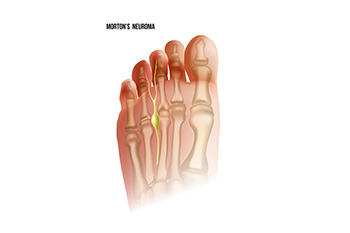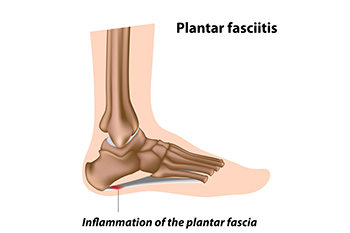
The pain from the foot condition that is known as Morton’s neuroma is generally felt between the third and fourth toes. It affects the nerve in this area and can happen from wearing shoes that do not have adequate room in the toe area. High heels fall into this category, and Morton’s neuroma may develop when they are frequently worn. A neuroma occurs when the nerve becomes pressed or irritated, and if left untreated, it may begin to swell and enlarge. Common symptoms that are experienced can consist of pain, burning, or a numbing sensation. Some people describe the feeling as having a pebble or marble in their shoe, and the discomfort may increase if tightly laced shoes are worn. Relief may be found when shoes are worn that have enough room in the toe area to move freely in, and the affected foot is elevated. If you have pain in this part of your foot, it is suggested that you speak with a podiatrist who can effectively diagnose and treat Morton’s neuroma.
Morton’s neuroma is a very uncomfortable condition to live with. If you think you have Morton’s neuroma, contact Frank Henry, DPM of Marble Falls, TX. Our doctor will attend to all of your foot care needs and answer any of your related questions.
Morton’s Neuroma
Morton's neuroma is a painful foot condition that commonly affects the areas between the second and third or third and fourth toe, although other areas of the foot are also susceptible. Morton’s neuroma is caused by an inflamed nerve in the foot that is being squeezed and aggravated by surrounding bones.
What Increases the Chances of Having Morton’s Neuroma?
- Ill-fitting high heels or shoes that add pressure to the toe or foot
- Jogging, running or any sport that involves constant impact to the foot
- Flat feet, bunions, and any other foot deformities
Morton’s neuroma is a very treatable condition. Orthotics and shoe inserts can often be used to alleviate the pain on the forefront of the feet. In more severe cases, corticosteroids can also be prescribed. In order to figure out the best treatment for your neuroma, it’s recommended to seek the care of a podiatrist who can diagnose your condition and provide different treatment options.
If you have any questions, please feel free to contact our office located in Marble Falls, TX . We offer the newest diagnostic and treatment technologies for all your foot care needs.





